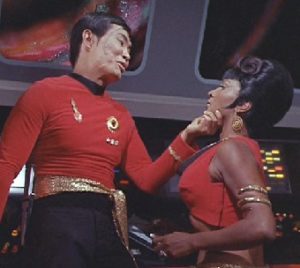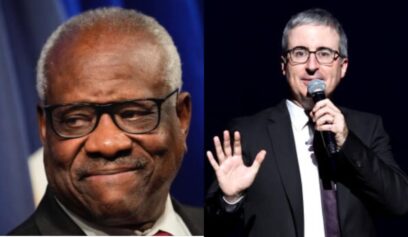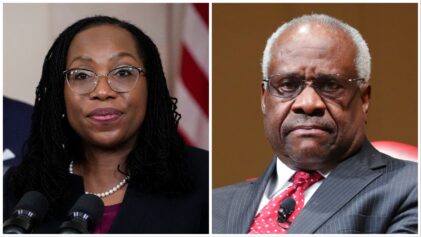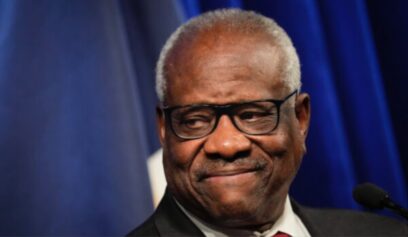From burning Black churches to Clinton and Bush presidential campaigns, the system of white supremacy produces alarming repetition. This redundancy stems from an unwavering dedication to the preservation of white power.
The early days of the summer of 2015 look woefully similar to the summer of 2013.
Sanford, Florida, and the Trayvon Martin murder trial hypnotized millions. The acquittal of Martin’s killer prompted President Barack Obama to confirm that racism exists. He emphasized, “Trayvon Martin could have been me.” The Supreme Court’s controversial invalidation of a portion of the Voting Rights Act of 1965 resulted in Justice Clarence Thomas being branded an “Uncle Thomas.”
This summer, we’re days from the commencement of the Charlotte, North Carolina, trial in the shooting death of Jonathan Ferrell; a white enforcement officer killed the unarmed Black male in the summer of 2013. The massacre at Charleston, South Carolina’s Mother Emanuel A.M.E. Church inspired Obama to acknowledge how white supremacy has been methodically crafted “as a means of control, a way to terrorize and oppress” Black people. Two years removed from “Uncle Thomas” slights, the Supreme Court’s lone Black member is now rebuked as a racial fraud.
Star Trek icon and LGBT activist George Takei launched a crude, tacky tirade in response to the Black justice’s dissenting opinion on same-sex marriage. He accused Thomas of “[abdicating] and [abandoning] his African American heritage” and left no ambiguity, tarring him as “a clown in blackface.”
Takei cited a specific portion of the justice’s legal opinion that necessitated anti-Black slurs:
“Slaves did not lose their dignity (any more than they lost their humanity) because the government allowed them to be enslaved. Those held in internment camps did not lose their dignity because the government confined them. And those denied governmental benefits certainly do not lose their dignity because the government denies them those benefits.”
My consensus with Justice Thomas is irregular. But #BlackSelfRespect, not philosophical agreement, demands that any manifestation of anti-Blackness be identified and contested. Takei earmarked his disgust exclusively for Thomas; the justice’s Blackness became an inextricable, explicit component of Takei’s indictment.
As a survivor of the World War II internment camps, Takei is acquainted with white terrorism. But while lambasting Thomas, he regurgitates the most hackneyed, belabored racist tropes of the last 300 years. According to Takei, it’s not just that Thomas “doesn’t belong” on the Supreme Court, “He’s a disgrace to America.” Racists have long insisted that Black people are defective, unqualified to be judges, attorneys or valued citizens. The current president is daily lampooned for being insufficiently American; in 2011, CBS reported that 25 percent of all Americans “think President Obama was not born in the United States.” White supremacy guarantees that the most familiar gripe concerns underserving Blacks responsible for catastrophic ruin.
New Republic’s Jeet Heer also noted that Takei’s conduct reflects a pattern of attacks aimed at Thomas that “have a tendency to focus impertinently and offensively on his [Black] person.” Heer concludes, “The frequent jokes about Thomas … being Justice Antonin Scalia’s ‘sock puppet’ imply the justice is an unqualified quota hire.” Because of racism, Thomas’ melanin arouses belligerent scrutiny, hampers his fitness for the court and explains why Takei and others reserve their undiluted contempt for him.
Takei rationalized his original “blackface” remarks as a product of spontaneous rage. After a day of reflection, he announced a lack of racist intent. He labeled Justice Thomas a minstrel only to convey that he was a “Black buffoon.” Specifically: “A white actor who blackens his face to play a Black buffoon.”
“Black made any insult worse. When you called somebody a ‘bastard,’ that was bad. But when you called somebody a ‘Black bastard,’ now that was terrible. In fact, when I was growing up, being called ‘Black,’ period was grounds for fighting.” – Assata Shakur
Not a buffoon. “A Black buffoon.”
Takei’s clarification is both profound and conventional. Invalidating the Blackness of Clarence Thomas is monotonous. What’s remarkable is that Takei labeling him a racial imposter verifies the racist nature of his critique. Three other justices opposed the same-sex marriage decision. No one impugns the racial allegiance of Justice Scalia, Justice Samuel Alito or Chief Justice John Roberts. Opposition to “marriage equality” didn’t void their whiteness. Takei constructed a premeditated assault designed to singularly target and crucify a “faux” Black justice.
Rituals are defined as religious behaviors or actions regularly and invariably followed by people. Chappelle Show writer and entertainer Paul Mooney submits that white folks have sanctified the art of blaming n*ggers. Predictably, many white and non-white people exalted Takei for exorcising a demonic Negro who “deserves a lot of disdain.” The Young Turks’ John Iadarola and Ana Kasparian praised Takei’s eloquence, declared their love for him and strengthened the conviction that Black people are worthy of ridicule. Bonding rituals of racist culture – church bombings, lynchings, mocking Black people like Clarence Thomas – consistently occasion the humiliation and murder of Black people.
Political foes of LGBT rights have disappointed Takei previously. He did not resort to racial attacks and character defamation. He credits former California Gov. Arnold Schwarzenegger with launching his activist career. In 2005, Schwarzenegger vetoed a bill that would have authorized same-sex marriage in California. Takei didn’t brand the governor a bogus white man or declare him unfit for office. He reserved his uncouth antics for a Black person.
In an essay published by MSNBC, Takei again highlights Thomas’ Blackness:
“It seems odd that Justice Thomas, as an African American, would be an opponent of marriage equality. His own current marriage, if he had sought to have it some fifty years ago, would have been illegal under then-existing anti-miscegenation laws.”
Although Takei is not white, his treatment of Thomas mirrors the conduct of many white “liberals.” In the justice’s 2007 memoir, Thomas warned that, “[Liberal] whites … offered you a helpful hand so long as you were careful to agree with them, but slapped you down if you started acting as if you didn’t know your place.” Of late, nothing provokes more slaphappy whites than Black people unwilling to endorse gay rights.
Writer and editor Nick Chiles documented how this year’s GLAAD Media Awards continued “the trend of sweeping the entire Black community under the label ‘homophobia.’ When voters approved the 2008 California ban on same-sex marriage, The Washington Post mimicked Takei’s specific condemnation of Black people; they convicted Black Californians as murderers who ‘drove a stake through the heart of same-sex marriage.’ On the day of South Carolina State Senator Clementa Pinckney’s funeral, comedian and suspected racist Bill Maher questioned, “Who’s more against gay marriage than Black churches?”
The system of racism is designed to perpetually violate Black people. Perceived homophobia is satisfactory pretext for anti-Black aggression, although justification is unnecessary.
Takei penned a Fourth of July-inspired apology where he acknowledged regret for his lack of civility. Hopefully, South Carolina exhausted Black forgiveness.
Gus T. Renegade is the host of The C.O.W.S. Talk Radio – a platform designed to dissect and counter racism. He has interviewed and researched authors, filmmakers and scholars from around the globe.



